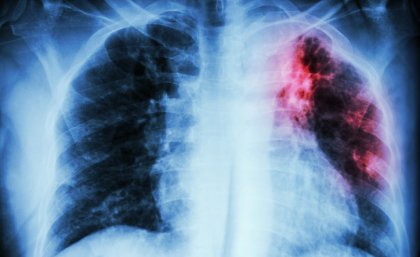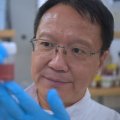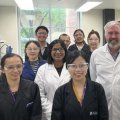
A team of Queensland researchers developing new antibiotics to treat tuberculosis has been awarded $1.45 million by the US Department of Defense.
The three-year multidisciplinary project is a collaboration between The University of Queensland’s Associate Professor Antje Blumenthal, Professor Rob Capon and Professor David Fairlie.
Dr Blumenthal said the new antimicrobials originated from naturally occurring compounds.
“Tuberculosis is the world’s leading cause of death due to a single bacterium, and the incidence of multi-drug-resistant tuberculosis is very concerning,” she said.
“Approximately 10 million cases of tuberculosis are diagnosed annually, with the disease causing 1.7 million deaths every year.
“There is a desperate need for new antibiotics and other new treatment options.”
Dr Blumenthal said management of multi-drug-resistant tuberculosis could take up to two years, compared to six to nine months for drug-sensitive tuberculosis.
“The antibiotics used for treating tuberculosis have serious, toxic side effects,” she said.
“Many have to be taken daily and some are injected, which can make it very hard to comply with the treatment requirements.
“This funding will allow us to progress the most promising compound identified in an earlier study in 2014.”
Dr Blumenthal said that discovery identified a compound naturally made by soil bacteria that was effective against tuberculosis bacteria.
“Our collaborators were able to produce the compound in the lab, which is not always possible when discovering natural products,” she said.
“Now we are working to optimise this compound’s structure to make it more effective in killing tuberculosis bacteria.
“We are also trying to understand how exactly this new class of compounds kills the bacteria, as this may guide precise design of new compounds that can be developed into new drugs.
“Our translational research addresses an urgent global medical need with the potential to positively impact the lives of millions.
“Grants like these showcase our capacity to undertake high-quality, internationally recognised research.”
The project follows research previously co-funded in 2016 by an Australian Tropical Medicine Commercialisation grant from the Australian government, the UQ Diamantina Institute and UQ’s Institute of Molecular Bioscience.
Media: Associate Professor Antje Blumenthal, a.blumenthal@uq.edu.au, +61 7 3443 6984; Faculty of Medicine media, med.media@uq.edu.au, +61 7 3365 5118.
.jpg)




